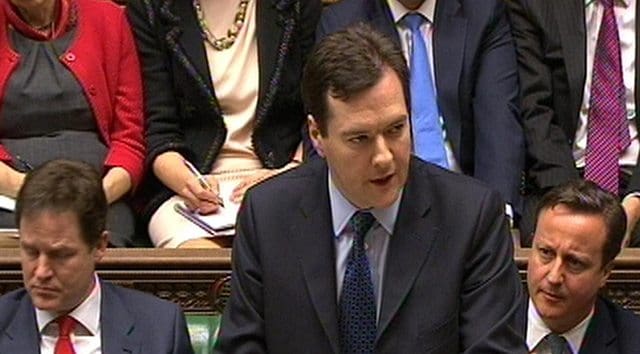George Osborne will be handed an encouraging assessment of the state of the economy on Tuesday as a survey of businesses predicts that Britain will avoid a triple-dip recession, reports The Guardian.
The forecast from the British Chambers of Commerce (BCC) suggests the UK will not plunge into an unprecedented third downturn, but says any improvement in the economy is likely to be slow and protracted. The BCC called on the chancellor to implement rapidly the measures he outlined in last month’s budget to stimulate the economy.
The report comes amid weaker-than-expected manufacturing data from the US and China, which on Monday caused Wall Street’s S&P 500 index to fall back from its record high reached last week.
In the UK, strong exports bolstered the services sector in the first three months of the year. The BCC’s survey of more than 7,000 companies showed services exports came close to all-time highs reached in 1994.
A strong performance from the services sector – which covers activities that range from retail to banking, and accounts for three-quarters of the UK economy – could result in a positive reading for first-quarter GDP, due to be published on 25 April.
After the economy contracted in the final three months of last year, another quarter of contraction at the beginning of this year would push Britain into a triple-dip recession. Current forecasts for GDP in the first quarter range from a 0.2% decline to 0.2% growth.
David Kern, chief economist at the BCC, said the survey results were encouraging. “Fears of another recession are calmed by our results,” he said. But he said the economy was still weak compared with long-term trends and the survey pointed towards a “slow and protracted upturn”.
The chancellor used his budget to introduce a number of measures to stimulate the housing market and construction industries. John Longworth, director general of the BCC, called for the government to quickly implement these measures to get growth moving.
“We should not be satisfied with a long and tortuous road to recovery,” he said. “These results provide a glimpse of the as-yet-distant sunlit uplands of recovery. Businesses up and down the country are working hard to drive the economy, create jobs and export, but they cannot accelerate this process alone.”
The manufacturers’ organisation, the EEF, added its voice to calls for the government to help drive a recovery. Roger Salomone, of the EEF, said: “Government must reassess its investment priorities, act faster on major issues like airport capacity and take the politics out of infrastructure by setting up an independent commission.
The fragility of the UK economy contrasts with the US where data published on Monday showed the manufacturing sector continued to grow in March. However, the pace of growth slowed more than expected.
The Institute for Supply Management manufacturing purchasing managers’ index fell to 51.3 in March from 54.2 in February – above the 50 mark that separates expansion from contraction, but short of forecasts of a reading of 54.
China’s manufacturing sector gathered pace in March, growing at its fastest rate in 11 months, but economists expected a bigger recovery from February’s five-month low.
The news prompted falls in US shares, after the S&P 500 closed at a record high on Thursday. It fell 0.5% on Monday, while the Dow Jones Industrial Average was 0.2% lower.
A separate survey out on Tuesday shows that Britain’s key financial services sector rebounded strongly in the first quarter, with a rise in business volumes and an increase in profits.
Almost half of the companies surveyed by the business lobby group the CBI and the accountancy firm PricewaterhouseCoopers said business volumes increased in the first quarter, while only 17% reported a fall. But the pace of growth was slower than expected, partly because of an unexpected rise in costs as companies took on more staff.


